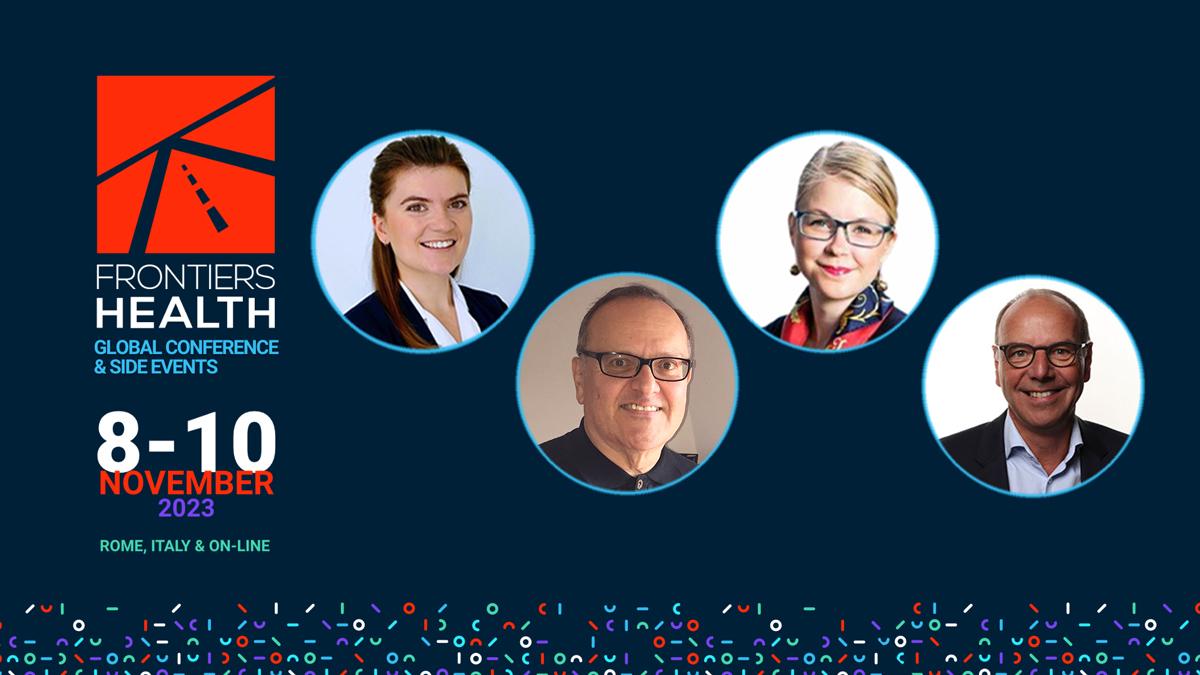Meet the innovators doing precision health, medicine NOW

At Frontiers Health 2023, a panel will look at real-world, active examples of paradigm-shifting precision health and medicine work in the cardio-metabolic space. Dr Charles Alessi tells us more.
The transition into the future of health is not just about new technologies bringing improvements. Sometimes it requires vision and intentionality to see how new technology can be paired with new ways of doing things, rather than just empowering us to do things the old way faster.
When it comes to non-communicable cardiometabolic diseases, there’s a growing group of stakeholders calling for innovation from the ground upwards towards a model of preventative, precision health. Dr Charles Alessi, chief clinical officer at éditohealth, is one such leader, and at Frontiers Health 2023 he’ll be presiding over a session of like-minded individuals not only sharing ideas about this paradigm shift, but actually preparing to put them into action at scale.
“We can do all sorts of things we could only dream of doing in the past, but we've always assumed that just because the technology is there, and because it makes sense to adopt it, it will be adopted,” Alessi told pharmaphorum. “Well, actually, that doesn't necessarily always follow.”
He says that the type and scale of data we have available should be enough for us to start thinking about a new, holistic approach to care.
“There's a real connection between a whole host of different non-communicable diseases and in medicine we tend to divide them into cardiovascular, metabolic, cancers, and rheumatic diseases, seeing them as completely separate, but actually they share an awful lot in terms of their causation and also in terms of their risk factors,” he said. “Over the last few years, we've realised that the only way to manage these non-communicable diseases is by adopting a life course approach, ideally starting to manage them from the moment we’re born.”
Meet the innovators
While Alessi will be moderating the session, insights will come from several different innovators in the space.
Gerhard Hindricks, head of the Digital Health Committee for the European Society of Cardiology, will chat with Alessi to lay the scientific and trends groundwork for the rest of the session.
“We’ll be having a conversation about this, about the confluence of all the data we need to manage health and care better along the life course,” Alessi explained.
The next two speakers will really take the conversation from theory into practice. Linda Soikkeli, a senior specialist in the Ministry of Social Affairs and Health for Finland, will be discussing MyKanta, a national system for patient data.
“In Finland, as of the end of last year, all social care data in the whole country has been ingested and is now part of the MyKanta process,” Alessi said. “So, this is an example of a nation who is taking this extremely seriously, to the degree, I might add, that their aspiration is to spend 50% of their health budget in the future on prevention. Now, what is that going to mean in terms of how their healthcare looks like at the moment? Because this really is revolutionary. I know of no nation anywhere in the world that talks about 50% spent on prevention.”
Finally, attendees will hear from Charlotte Kenny, clinical product lead at Metadvice, a UK start-up using AI to manage multimorbid patients. In Alessi’s words, Metadvice is “really trying to do this precision health and precision medicine […] in small panels of patients, thousands at a time, and do it at scale and at pace.”
“So. these are two examples of people who have done things, rather than people who have said they're going to do things,” Alessi stressed. “Finland has already integrated that data and, in the UK, they're already managing the precision health and precision medicine for cardiac metabolic diseases in some cases, and this is an example of that.”
After that, Alessi will lead a panel discussion with all three speakers to tease out some lessons for the future.
Bringing prevention and precision health into practice
These speakers will present in service of larger ideas about transforming healthcare, ideas that drive Alessi and éditohealth.
“In essence, we can think of the management of these conditions in two big chunks: the precision health approaches, which are the approaches that we need to adopt to de-risk individuals or to manage the risk factors better, and the precision medicine approaches, which are what happen after you diagnose or after you develop symptoms. But, in essence, for optimal treatment, you need to manage all of them,” he said.
And, of course, all of this is underpinned by the technology we use to capture and manage data.
“The moment one starts thinking in this way, one then starts thinking about the intersection between digital transformation and, this, because of course the ability to be able to personalise healthcare, associated with the fact that we can pull data from a whole host of different sources, is absolutely ideal to do this,” he said. “And, really, we can start to think in terms of how we manage populations and individuals, and how individuals manage themselves in a world whereby they can do all this.”
Not that it will be easy. There will be challenges, including the ethical and regulatory considerations around data sharing.
“Secondly, there are challenges in getting citizens to accept, to share their data because not everybody has had the experience of Finland.” he added. “That started with MyKanta, really, years and years ago, to get people used to sharing data and the value of sharing data. We've seen plenty of examples of data sharing that hasn't gone as well as it could.”
Even getting the right incentives to governments can be a challenge.
“The timescale for reward here, for results, can be longer than an electoral timescale. That's a real challenge if there's an election in three years and I'm not going to see results until five years,” Alessi said. “Is it worth investing in this? Because it won't help me get re-elected next time.”
Nonetheless, these barriers can be overcome, and the panel assembling at Frontiers Health will be doing their best to help give the industry some tips to overcome them.
Frontiers Health will be held from 8th to 10th November at the Auditorium della Tecnica in Rome, Italy, as well as online. Click here to register. You can see “Cardio-Metabolic Diseases: Deploying Precision and Prevention at Scale” on Wednesday at 4.30pm local time.













